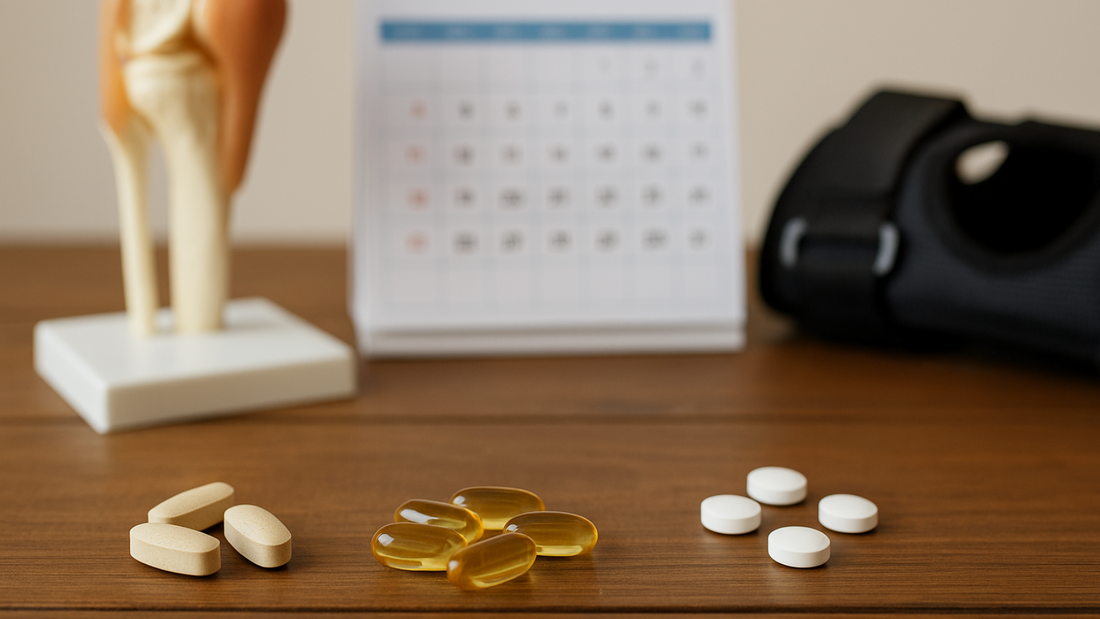Heading into total knee replacement? Beyond appointments and logistics, prepping your body with targeted nutritional supplements can provide a significant improvement to your recovery and overall outcomes.
Let’s break down the key supplements that have clinically shown benefits in surgical contexts—and how they can support outcomes.
Why does Nutrition & Supplements Matter Pre‑Knee Replacement?
1. Surgery is a metabolic and inflammatory stress event
When you undergo surgery, your body:
- Enters a catabolic (tissue-breaking) state
- Triggers inflammation and oxidative stress
- Requires more energy and nutrients to repair tissue, fight infection, and rebuild strength
If your body is undernourished going in, recovery is slower and complications are more likely.
2. Many patients are unknowingly deficient
Studies show that adults (especially older ones) are commonly low in:
- Vitamin D (linked to wound healing and muscle function)
- Vitamin C and Zinc (essential for collagen and immune response)
- Protein and amino acids (vital for muscle maintenance and tissue repair)
Even patients with “normal” diets may be at risk due to poor absorption, medication interactions, or age-related changes in metabolism.
3. Muscle loss starts immediately...and fast
Within 3–5 days of reduced movement during recovery, patients can begin losing lean muscle. For total knee replacement, this ends up affecting:
- Joint stability
- Balance and fall risk
- Post-op rehab progress
Protein and amino acids pre-op help preserve muscle and support strength after surgery.
4. Strong nutrition = lower risk of complications
Research shows patients with good nutritional status are less likely to experience:
- Infections
- Delayed wound healing
- Poor bone integration of implants
- Longer hospital stays
A 2023 review in Nutrients noted that pre-surgical nutrition optimization—especially protein and micronutrient repletion—reduces complication rates and speeds recovery in orthopedic patients.
5. It’s one of the few things you can control before surgery
You can’t change your age or surgical complexity. But you can control your nutritional readiness—making you a stronger, more resilient surgical patient.
What Are the Best Supplements to Take Before Knee Replacement Surgery?
Protein & Amino Acids
Protein and Amino Acids reduce muscle atrophy in patients undergoing total knee arthroplasty (TKA). In one meta-analysis of 19 trials with 903 patients, EAAs significantly reduced quadriceps and hamstring muscle loss and improved protein synthesis when given perioperatively.
When & What?
- Begin 30–60 days pre-op if possible
- Continue through surgery and during recovery until healthy
- Whole whey protein supplements provide a great source of high-quality protein
- Amino acid products rich in leucine have the most supporting data for surgery
Multivitamin & Key Micronutrients
A well-designed multivitamin is a safety net for critical micronutrients. Research shows pre-op multivitamin use improves levels of:
- Vitamin C & Zinc: Crucial for collagen formation, immune function, and wound healing
- Vitamin D: Low preoperative levels correlate with poorer outcomes; supplementation may reduce complications
- B Vitamins (B6/B12/folate): Support oxygen delivery, nerve repair, and red blood cell function
- Iron: Essential for healing and infection prevention, especially in anemic patients
Quick tip: Choose a multivitamin with bioavailable forms (e.g., methylfolate, methyl‑B12, chelated minerals) and clinically relevant doses.
Omega‑3s (Fish Oil)
Omega‑3 fatty acids (EPA and DHA) are another supplement worth considering during surgery prep. These anti-inflammatory compounds have been shown to reduce inflammation and complications while supporting healing in some patients.
What the research shows:
- Omega‑3s help reduce systemic inflammation, improve immune response, and may lower the risk of postoperative complications such as infection and delayed wound healing
- They have also been associated with shorter hospital stays in major surgeries involving immunonutrition protocols.
Should you take them?
Talk with your healthcare provider. While omega‑3s can be beneficial, individual factors—like medications, bleeding risk, and your overall health—should guide this decision.
Hydration & Electrolyte Supplements
Most patients think of hydration as something to worry about after surgery—but it’s just as important before the procedure.
Staying properly hydrated in the days and hours leading up to knee replacement surgery can:
- Support healthy blood flow and oxygen delivery
- Improve energy levels and reduce fatigue
- Help maintain electrolyte balance during fasting
- Reduce postoperative nausea and dizziness
Why it matters:
Even mild dehydration can negatively affect healing and how your body responds to anesthesia. A retrospective study of over 340,000 total knee replacement patients have shown that pre-operatively dehydration can result in an increased length of stay (LOS) in the hospital as well as higher risks of complications such as deep vein thrombosis (DVT).
Set Yourself Up for a Stronger Recovery
A knee replacement is a major step toward reclaiming mobility and quality of life. But surgery is only one part of the equation—how you prepare your body beforehand has a direct impact on how well you recover afterward.
By focusing on evidence-based supplements like protein, amino acids, multivitamins, hydration support, and (in some cases) omega-3s, you’re giving your body the tools it needs to:
- Heal faster
- Reduce inflammation
- Protect muscle
- Avoid common complications
Best of all? Nutrition is one of the few things fully within your control during this process. And with a structured plan, you don’t have to guess what to take or when.
At SurgicalRx, we’ve simplified it with our OrthoRx Bundle, designed specifically for joint replacement patients looking to support their recovery from the inside out.
Don’t just go into surgery hopeful—go in prepared.




